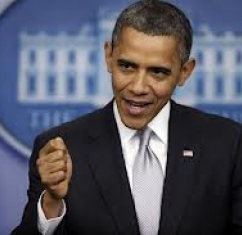
President Obama announced his climate change action agenda on Tuesday, June 25 Here's an excerpt from his remarks as reminds us of the history of business interests crying wolf every time we passed laws to make us safer, healthier and more secure. And, he points out, "every time they've been wrong."
"Now, what you’ll hear from the special interests and their allies in Congress is that this will kill jobs and crush the economy, and basically end American free enterprise as we know it. And the reason I know you'll hear those things is because that's what they said every time America sets clear rules and better standards for our air and our water and our children’s health. And every time, they've been wrong.
"For example, in 1970, when we decided through the Clean Air Act to do something about the smog that was choking our cities -- and, by the way, most young people here aren't old enough to remember what it was like, but when I was going to school in 1979-1980 in Los Angeles, there were days where folks couldn't go outside. And the sunsets were spectacular because of all the pollution in the air.
"But at the time when we passed the Clean Air Act to try to get rid of some of this smog, some of the same doomsayers were saying new pollution standards will decimate the auto industry. Guess what -- it didn’t happen. Our air got cleaner.
"In 1990, when we decided to do something about acid rain, they said our electricity bills would go up, the lights would go off, businesses around the country would suffer -- I quote -- “a quiet death.” None of it happened, except we cut acid rain dramatically.
"See, the problem with all these tired excuses for inaction is that it suggests a fundamental lack of faith in American business and American ingenuity. (Applause.) These critics seem to think that when we ask our businesses to innovate and reduce pollution and lead, they can't or they won't do it. They'll just kind of give up and quit. But in America, we know that’s not true. Look at our history.When we restricted cancer-causing chemicals in plastics and leaded fuel in our cars, it didn’t end the plastics industry or the oil industry. American chemists came up with better substitutes. When we phased out CFCs -- the gases that were depleting the ozone layer -- it didn’t kill off refrigerators or air- conditioners or deodorant. (Laughter.) American workers and businesses figured out how to do it better without harming the environment as much.
"The fuel standards that we put in place just a few years ago didn’t cripple automakers. The American auto industry retooled, and today, our automakers are selling the best cars in the world at a faster rate than they have in five years -- with more hybrid, more plug-in, more fuel-efficient cars for everybody to choose from.
"So the point is, if you look at our history, don’t bet against American industry. Don’t bet against American workers. Don’t tell folks that we have to choose between the health of our children or the health of our economy.
"The old rules may say we can’t protect our environment and promote economic growth at the same time, but in America, we’ve always used new technologies -- we’ve used science; we’ve used research and development and discovery to make the old rules obsolete.
"Today, we use more clean energy –- more renewables and natural gas -– which is supporting hundreds of thousands of good jobs. We waste less energy, which saves you money at the pump and in your pocketbooks. And guess what -- our economy is 60 percent bigger than it was 20 years ago, while our carbon emissions are roughly back to where they were 20 years ago.
"So, obviously, we can figure this out. It’s not an either/or; it’s a both/and. We’ve got to look after our children; we have to look after our future; and we have to grow the economy and create jobs. We can do all of that as long as we don’t fear the future; instead we seize it."


Add new comment